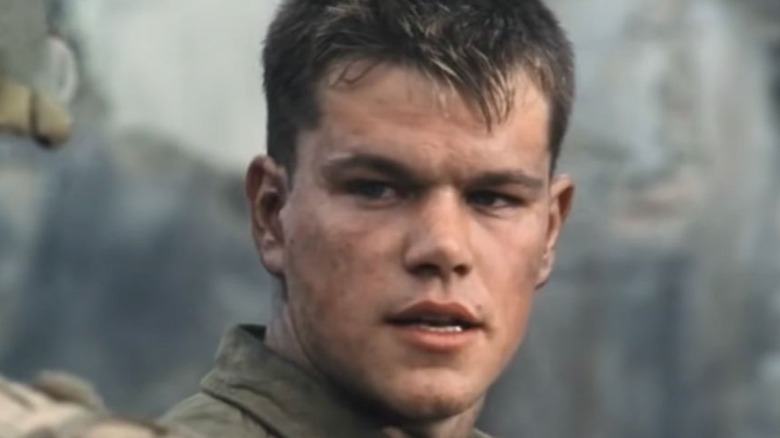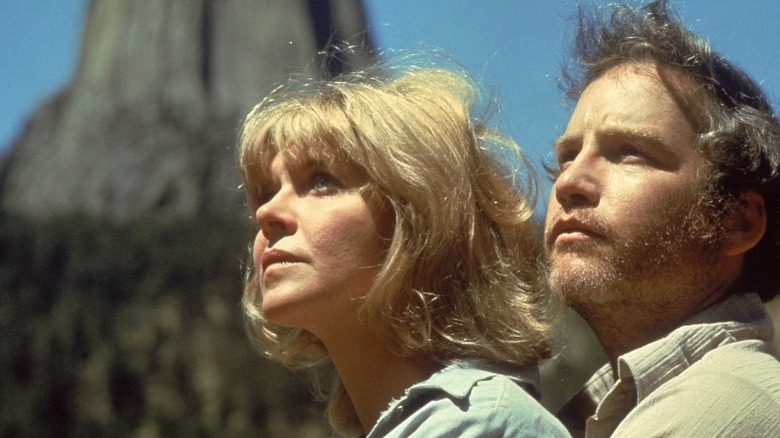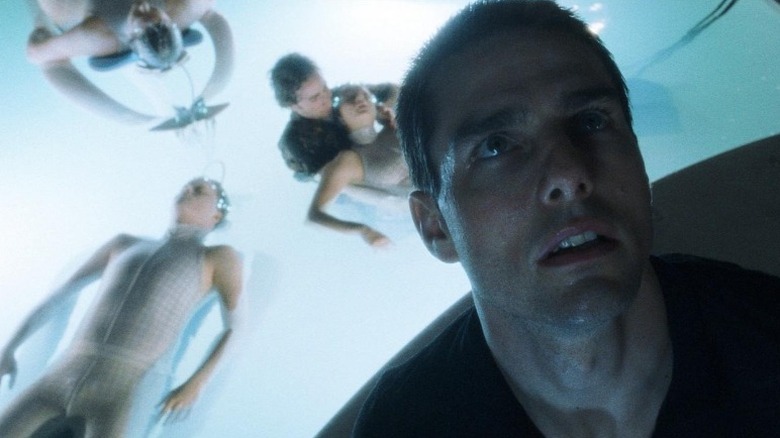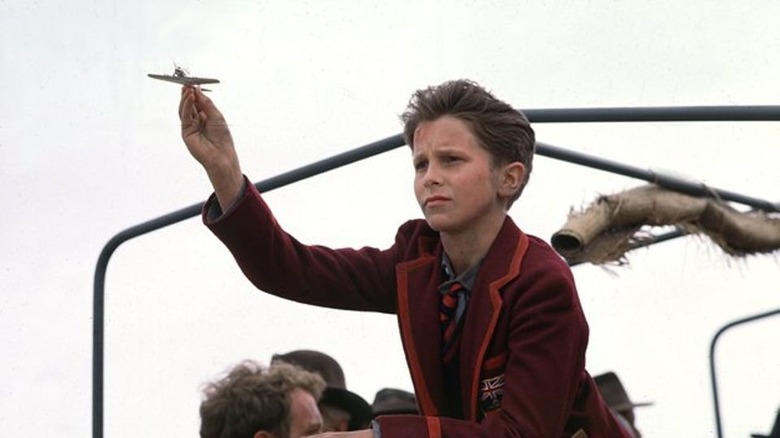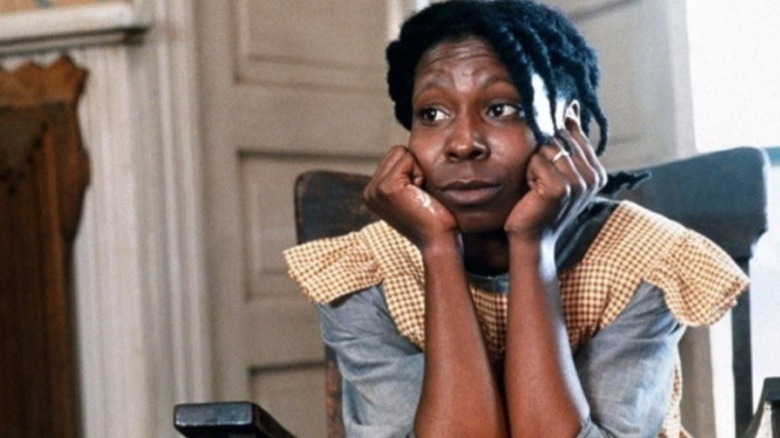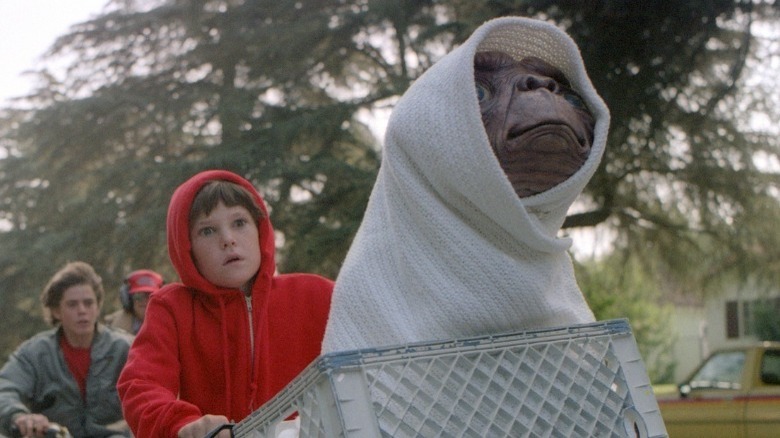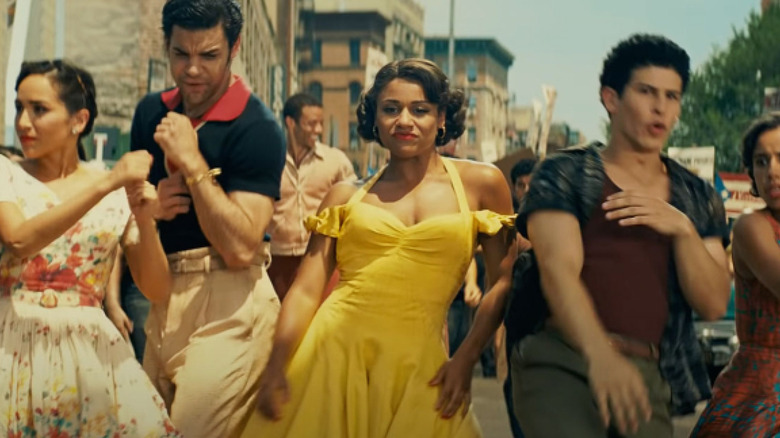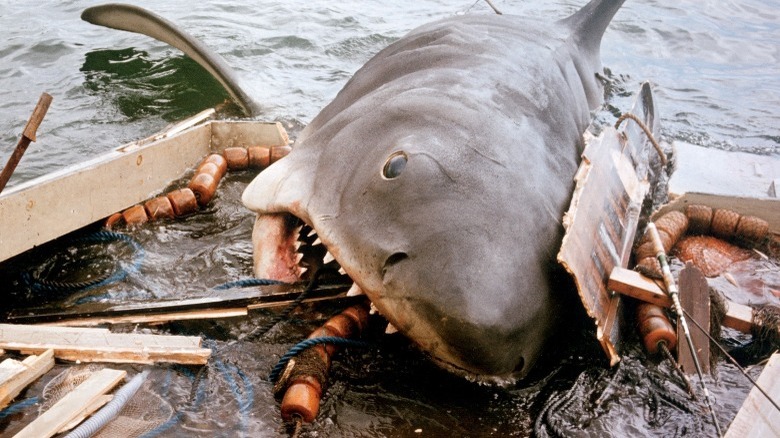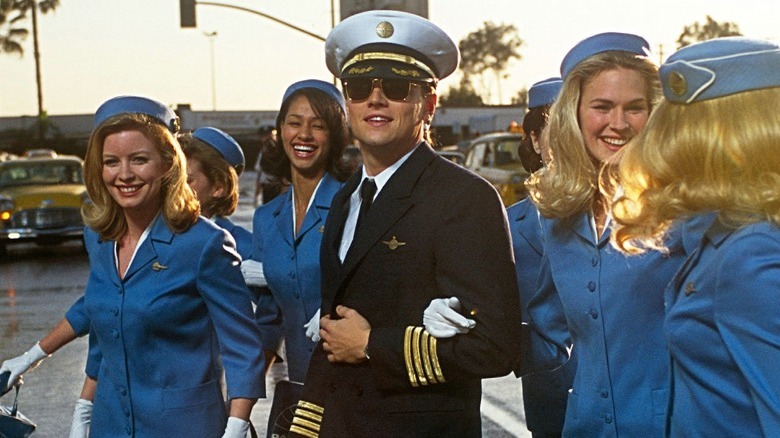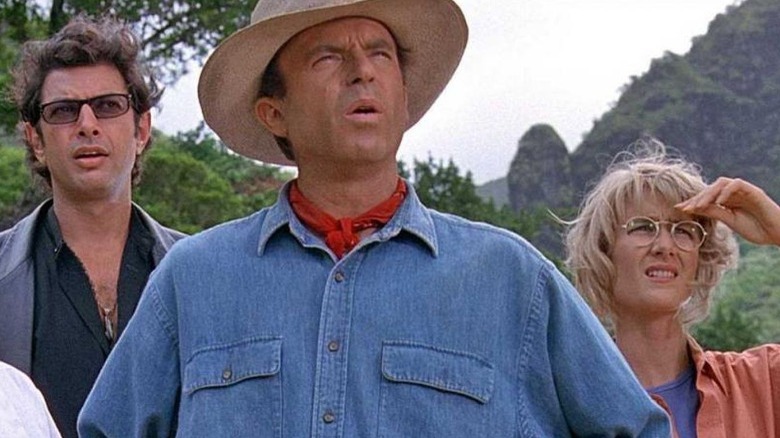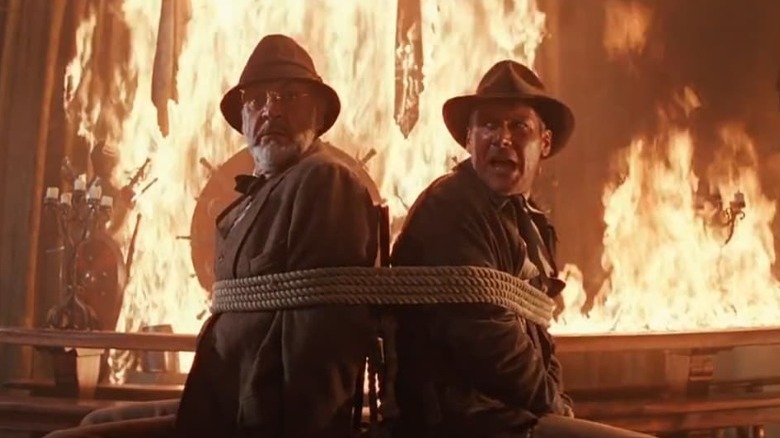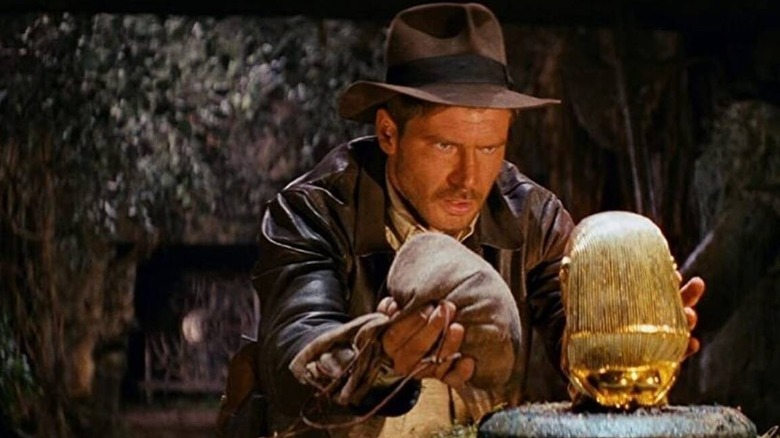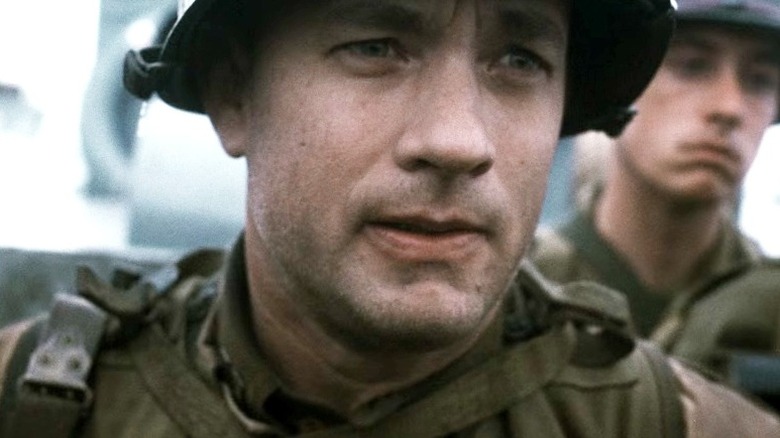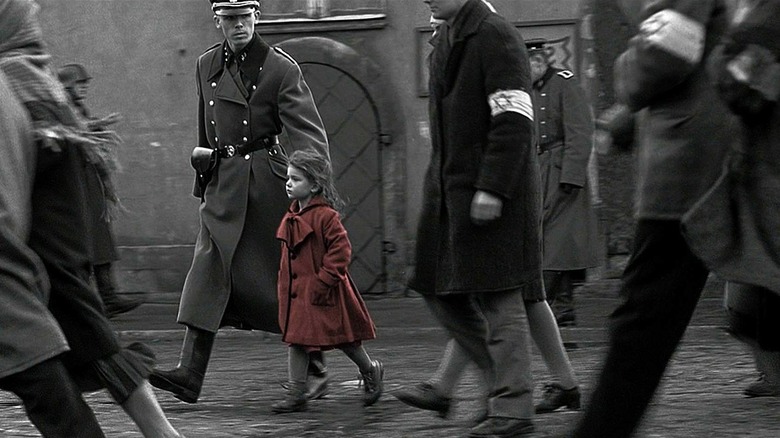Steven Spielberg's Best Movies According To IMDb
Few filmmakers have made their mark quite like Steven Spielberg. The director practically invented the blockbuster with "Jaws," which catapulted him to a level of superstardom that he's maintained since 1975. His filmography is tremendously expansive, tackling just about every genre under the sun with films as varied as "The Adventures of Tintin," "Amistad," "The Terminal," and "Munich." Spielberg's career started in television, where he made the brilliant TV movie "Duel" that helped put his name out there as a director on the rise.
Much of Spielberg's filmography is marked by a deep understanding of human behavior, especially the beautiful intricacies of childhood wonder. Though many of his films are action-packed blockbusters, every one of Spielberg's films has a strong emotional core. Spielberg is also known for his hugely successful working relationships, particularly with composer John Williams and cinematographer Janusz Kaminski, who have worked with Spielberg on a number of films. There are so many fan-favorite Spielberg movies, but which of his films are amongst his very best?
Close Encounters of the Third Kind
"Close Encounters of the Third Kind" is both a stunning sci-fi spectacle and a slow-burning family drama. Featuring a memorable score from Steven Spielberg's longtime collaborator John Williams, the film is a hypnotic, glorious experience. It's filled with a great deal of what makes Spielberg so wonderful: great acting, jaw-dropping special effects, intriguing interpersonal dynamics, and plenty of childhood wonder.
Although Spielberg originally wanted Steve McQueen in the lead role, Richard Dreyfuss is tremendous as Roy Neary, a man whose day-to-day life drastically changes when he encounters a UFO. The event causes Roy to become completely obsessed with aliens, sending him on a cross-country adventure to discover the truth about extraterrestrial life, even if his newfound focus threatens to tear his family apart. The film also stars beloved French filmmaker François Truffaut as Claude Lacombe and Teri Garr as Roy's wife, Ronnie.
"Close Encounters of the Third Kind" is widely celebrated as one of Spielberg's finest, as well as one of the all-time great science fiction films. Arthur Knight of The Hollywood Reporter said the film is "like an awesome light show that stuns the senses ... One of the virtues of Close Encounters is that it makes us want to know more."
Minority Report
Steven Spielberg's disturbingly prescient 2002 science fiction thriller film "Minority Report" is sublime. Set in the year 2054, it stars Tom Cruise as Chief John Anderton, who works for the "Pre-Crime" department. In this world, clairvoyant people called "Precogs" can see crimes happening in the future, and advanced technologies allow for criminals to be captured before they've actually committed any malfeasance. Things take a turn when Agatha (Samantha Morton), one of the future-telling Precogs, starts predicting things differently from the others. Anderton kidnaps Agatha to try and prove that the Pre-Crime system is dangerously flawed, as the other Precogs predict Anderton himself will murder a man he's never even met.
What hits especially hard about "Minority Report" today is just how well it understands our relationship with technology, which is remarkable considering most of the science involved didn't even exist at the time the film was released. Everything from personalized advertisements, touchscreen computers, and iris-scanners are all present in the film and have since become a part of our everyday lives. "Minority Report" was a huge box office success, also spawning a single-season television show.
Empire of the Sun
Steven Spielberg is a filmmaker of extraordinary ambition, which is on full display in "Empire of the Sun," a World War II epic with an extraordinarily dreamlike quality. One of Spielberg's finest qualities is his ability to infuse childlike imagination and wonder into even his most complex films, and "Empire of the Sun" is no exception.
The film features Christian Bale's first-ever starring role at the young age of 13, where he plays Jamie Graham, a boy who faces the horrifying transition of living with his wealthy family in Shanghai to an internment camp amidst the Japanese invasion of China. Jamie is captured alongside Basie (John Malkovich), an American soldier, who is determined to keep Jamie safe from the horrors around them. "Empire of the Sun" features some staggeringly beautiful imagery, brought to life by cinematographer and five-time Oscar nominee Allen Daviau.
The film was celebrated by critics, including Time's Richard Corliss, whose euphoric review said that Spielberg's film "has energized each frame with allusive legerdemain and intelligent density of images and emotions. He has met the demands of the epic form with a mature spirit and wizardly technique. Spielberg has dreamed of flying before, and this time he earns his wings."
The Color Purple
Steven Spielberg is no stranger to a large, sprawling film: Many of his go well over the 150-minute mark. "The Color Purple" joins the tradition of longer Spielberg films, and is certainly epic in scale, as it covers over 40 years in the life of Celie (Whoopi Goldberg). A Black woman living in the early 1900s, she spends "The Color Purple" searching for companionship and her own identity after struggling through terrible abuse for decades. The film marks a considerable departure for Spielberg, who had been on a streak of blockbusters, making "Raiders of the Lost Ark," "E.T.: The Extra-Terrestrial," and "Indiana Jones and the Temple of Doom," before pivoting to a period drama. It shouldn't be any surprise, however, that "The Color Purple" is equally impressive, proving once again that there isn't a genre Spielberg can't handle.
The film was a big success, piling up an impressive 11 Oscar nominations, including best picture, best actress for Whoopi Goldberg, and supporting nods for both Margaret Avery and Oprah Winfrey. Amazingly, the film was completely shut out, losing every single one of its 11 nominations. Still, the film has many fans, including film critic Roger Ebert, who in his four-star review called "The Color Purple" a "great, warm, hard, unforgiving, triumphant movie, and there is not a scene that does not shine with the love of the people who made it."
E.T.: The Extra-Terrestrial
Steven Spielberg movies have something of a reputation for creating unforgettable, deeply moving moments. There's no doubt that the shot of Elliot and E.T. riding a bike in front of the moon, paired with John Williams's triumphant score, may be the single most iconic image in his entire filmography. Few films have ever captured the magic of being a child quite like Spielberg's 1982 masterpiece "E.T.: The Extra-Terrestrial." It stars Henry Thomas as Elliott, a young boy who discovers a mysterious yet gentle alien, and his journey to help reunite the titular E.T. with his family.
The film was a massive financial success upon release: Adjusting for inflation at the box office, it's the fourth highest-grossing film ever. While Spielberg was making the film, he said that it was the most personal movie he ever made. It's easy to see why, as the film is a stunning portrait of a rather lonely boy, struggling with his parents' divorce, who finds a wonderful new friend. The emotional ending is almost impossible not to cry through, but we can take comfort in E.T.'s final lines: "I'll be right here."
West Side Story
Steven Spielberg has tackled just about every genre in existence with aplomb, with the exception of one glaring omission: the movie musical. When it was announced that Spielberg was planning to adapt "West Side Story," the stage musical whose 1961 film adaptation won a massive 10 Oscars, there was plenty of skepticism. Now that it has been released, it's abundantly clear we were wrong to doubt him: Spielberg's version of "West Side Story" is a magnificent reminder that Spielberg is a master of his craft.
Critics and fans alike love "West Side Story," a tale of forbidden love amidst the backdrop of a gang war in New York City between the Jets and the Sharks, whose conflict is based in ethnic and racial tensions. Spielberg's directorial talent has rarely been more evident than in the film's tremendous musical numbers. While so many filmmakers rapidly cut at every moment, Spielberg lets the camera move methodically, allowing the film's incredible scale and choreography to be fully appreciated. "West Side Story" has plenty of incredible moments, but perhaps are no finer than "America," featuring a show-stopping performance from Broadway stalwart Ariana DeBose.
Jaws
It's difficult to accurately assess the enormous impact that "Jaws" had on cinema when it was released in 1975: It essentially wrote the book on blockbuster filmmaking, and after "Jaws," modern cinema was never the same. The film earned an impressive $471 million worldwide, and as Steven Spielberg's second film released in cinemas (though he did make "Duel," "Something Evil," and "Savage" for TV), it made him a major name in Hollywood.
The film's plot is fairly straightforward: A killer shark is on the loose near Amity Island, a peaceful New England tourist hotspot. Police chief Martin Brody (the brilliant Roy Scheider) wants the beaches closed, but Mayor Vaughn (Murray Hamilton) refuses, so as to avoid creating a panic that would cost the town its valuable summer revenue. Brody is offered help from ichthyologist Matt Hooper (Richard Dreyfuss) and ship captain Quint (Robert Shaw), which leads to an epic showdown between man and shark. Although the production crew famously had some serious difficulties filming with the shark, "Jaws" is a dread-inducing thriller with incredible characters, brilliant dialogue, and masterful practical effects.
Despite some truly dreadful sequels, "Jaws" has an extremely devoted fanbase. It even has a podcast that is devoted to tackling the film in all its glory – minute by minute.
Catch Me If You Can
Steven Spielberg's snappy crime caper "Catch Me if You Can" is based on the real-life story of Frank Abagnale Jr., who discovers a talent for conning people as a teenager. Featuring a charismatic performance from Leonardo DiCaprio, "Catch Me If You Can" absolutely breezes through its nearly two-and-a-half-hour runtime, and has a spot on the IMDb top 250 list. It features Abagnale's remarkable feats of deception, as he steals millions of dollars by posing as a doctor, a prosecutor, a pilot, and just about anything else you could imagine.
His exploits draw the attention of the FBI, and especially agent Carl Hanratty (Tom Hanks), who sets off on a mad-cap, cross-country mission to finally take down the elusive Abagnale. While the film deals with some tough themes, "Catch Me If You Can" is a blast, and nobody seems to be having more fun than Spielberg himself. The film features a delightful Williams score, and the music, alongside a wonderful supporting turn from Christopher Walken, were both nominated for Oscars.
Jurassic Park
Theme parks are pretty amazing experiences all on their own. But what if a theme park could do the impossible, and bring back something lost to time? That's the question posed by Steven Spielberg's 1993 classic, "Jurassic Park," in which Dr. John Hammond (Richard Attenborough) creates a theme park filled with dinosaurs born from prehistoric DNA preserved in amber. What sounds like a truly life-changing opportunity proves to be just that — albeit, for all the wrong reasons. When the park's security systems are sabotaged, the visitors of the park, including Hammond's own grandchildren, fight to survive the hordes of dinosaurs that emerge from their pens.
A world-class example of practical effects wizardry, few films provide the boundless excitement of "Jurassic Park." While CGI can date your film quicker than just about anything, the astounding practical effects in "Jurassic Park" ensure that it remains timeless. The production team — including 6-time Oscar winner Dennis Muren — won the Oscar for visual effects, as well as two awards for sound.
It was such a big success that it ended up spawning a trilogy, as well as a reboot with "Jurassic World" — although none have reached the glorious heights of the original "Jurassic Park."
Indiana Jones and the Last Crusade
"Indiana Jones and the Last Crusade" is one of Steven Spielberg's very best movies, according to IMDb. In the final film of the original trilogy, Indiana Jones' (Harrison Ford) father, Professor Henry Jones (Sean Connery), disappears while pursuing the holy grail. Indy sets off on a quest to find him and stop the Nazis from discovering secret powers. The film features a truly delightful motorcycle chase scene, a moment that includes impressive maneuvering with a flagpole.
The film is unexpectedly one of Spielberg's funniest, and it's wonderful to see the actor who defined James Bond play a bumbling old man who consistently makes things more difficult for his son. The film features Indy's trademark action set-pieces, with plenty of beats you come to expect from the trilogy. Above all, "Indiana Jones and the Last Crusade" is just a lot of fun, and it makes for an absolutely perfect Sunday afternoon viewing.
Raiders of the Lost Ark
Steven Spielberg's 1981 film "Raiders of the Lost Ark" introduces us to Dr. Indiana Jones, the legendary archeologist and treasure-hunter who is often considered the single most iconic Spielberg character. There's something truly irresistible about Indy — he's resourceful, funny, and deeply charismatic. His outfit, comprised of a memorable leather jacket and brown fedora, has grown into an iconic ensemble. With a brooding yet accessible performance from Harrison Ford, any adventure with Indy is a pure delight. It's no wonder that two "Indiana Jones" films are amongst the highest-rated Spielberg films on IMDb.
In "Raiders of the Lost Ark," Indy is a world-renowned professor of archeology recruited by the American government to find the Ark of the Covenant. Such a prospect is undoubtedly daunting, and Indy finds himself up against far more than he bargained for, as he seems to draw the ire of the entire Nazi regime. The film has it all: a magnificent and hugely memorable John Williams score, a brilliant Lawrence Kasdan screenplay, and jaw-dropping moments that have been parodied endlessly.
Saving Private Ryan
Speaking of unforgettable: No film opens with an impact quite like "Saving Private Ryan." The landing at Omaha Beach features some truly haunting imagery, including a shocking moment where a soldier is carrying his own arm that he just lost in an explosion. The unrelenting horrors of war are made abundantly clear in this maelstrom of death and gore, and brilliant sound design makes the audience feel as though they are right there on the beach. While the rest of the film is also very impressive, it's the opening half-hour that is the most effective.
Once the brutality of Omaha Beach comes to a close, the plot springs into gear. Captain John H. Miller (Tom Hanks) and his squad (a brilliant ensemble including Vin Diesel, Barry Pepper, and Giovanni Ribisi) are given a mission to find paratrooper James Ryan (Matt Damon). His three brothers have been killed in action; the U.S. Government believes rescuing Ryan and bringing him back to his grieving mother would make for a positive news story on the home front. "Saving Private Ryan" was loved by fans and critics alike, achieving both box office success and winning an impressive five Oscars, including a well-deserved best director award for Spielberg.
Schindler's List
Taking the crown as Steven Spielberg's best film is one with a very different approach to World War II from "Saving Private Ryan": Our number one film is 1993's "Schindler's List." It focuses on Oskar Schindler (Liam Neeson), a member of the Nazi Party and an industrialist, who is determined to save his Jewish workforce in German-occupied Poland.
Shot in mesmerizing black-and-white (with one notable exception), "Schindler's List" is a harrowing story of the atrocities of the Holocaust. Spielberg's best films show the perseverance of the human spirit, and this is no exception. It's certainly Spielberg's most lengthy picture, clocking in at 195 minutes long. "Schindler's List" is one of the most acclaimed in cinematic history, dominating at the Academy Awards with seven Oscar wins, including best picture, best director (both firsts for the endlessly talented director), and best adapted screenplay. Perhaps Spielberg's magnum opus is best described by Susan Stark of the Detroit Free Press, who said "Once in a very great while, a movie insinuates itself so deeply into your consciousness that it offers not vicarious experience, but instead, direct experience. Spielberg's heartfelt, monumental 'Schindler's List' is such a movie."
